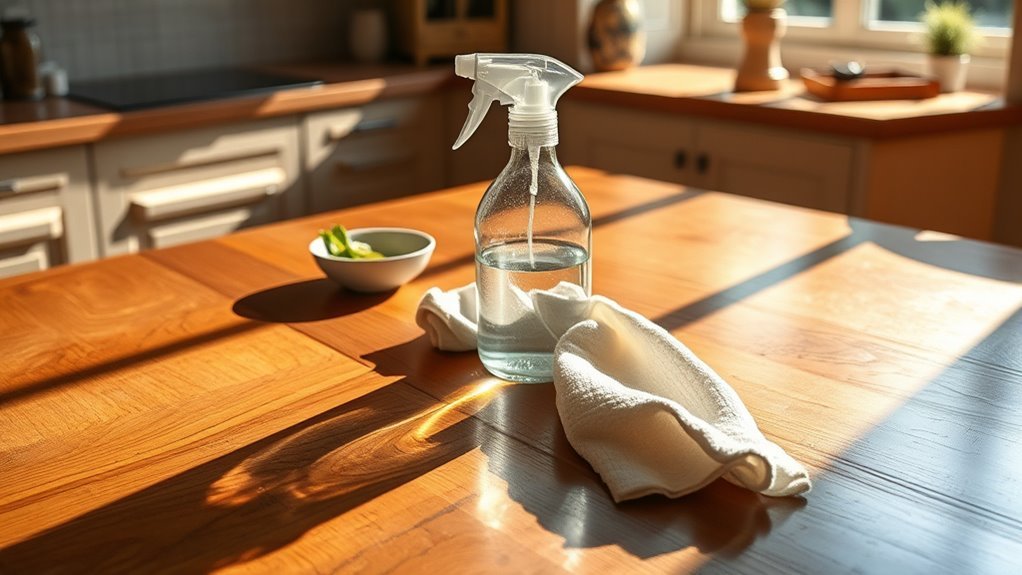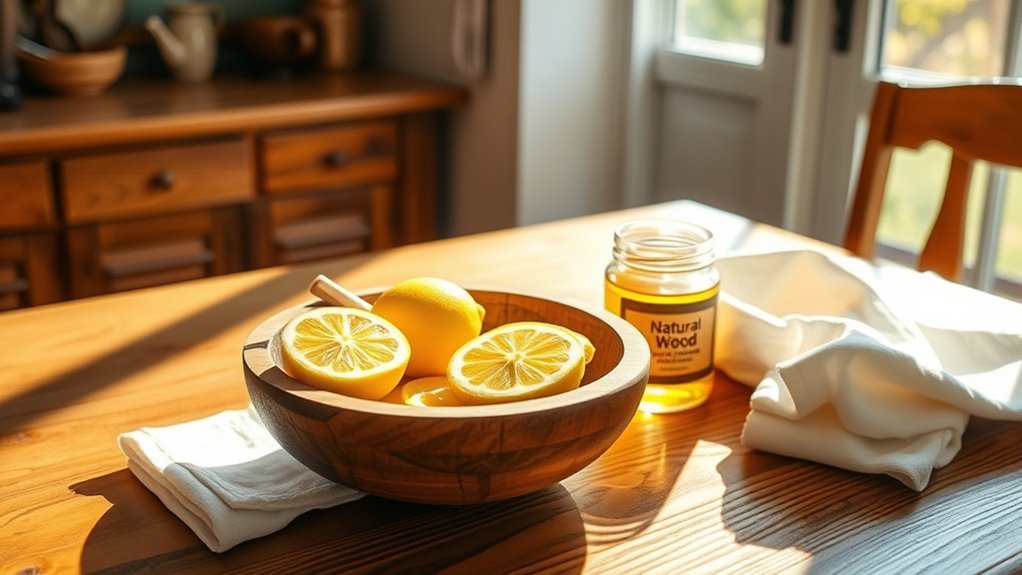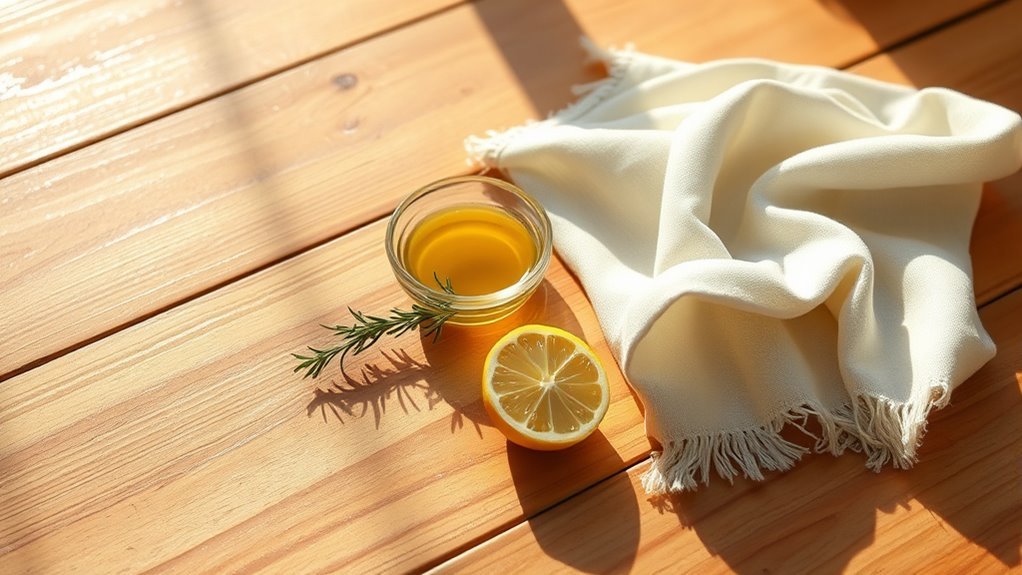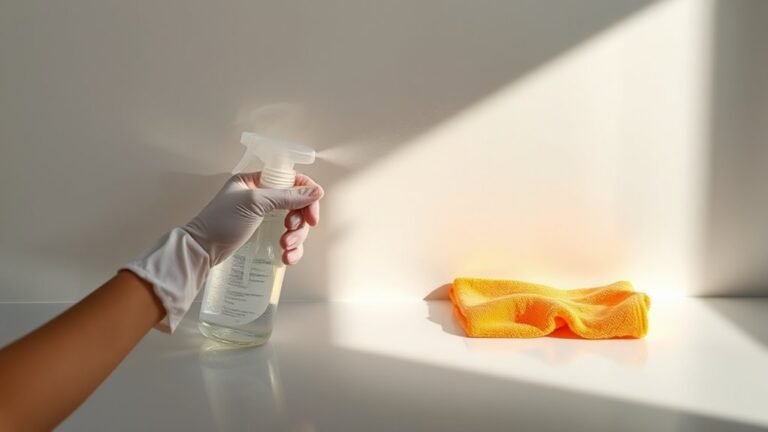Natural Cleaning Hacks for Your Wood
You can easily clean and protect your wood using natural household ingredients. For stains, try a baking soda paste or a gentle vinegar solution. To restore shine, nourish wood with linseed or tung oil, then buff it with a soft cloth. Dust and polish using a mix of olive oil and lemon juice, avoiding harsh chemicals. Keep mold away with white vinegar and condition wood regularly with beeswax. Want to discover more simple, effective techniques?
Removing Stains With Household Ingredients

Although wood can be sensitive, you don’t need harsh chemicals to remove stains; simple household ingredients like baking soda, vinegar, and lemon juice can effectively lift marks without damaging the surface. You can start by making a paste with baking soda and water, gently rubbing it onto the stain. Let it sit for a few minutes, then wipe it away with a clean cloth. For tougher stains, a vinegar solution—mix equal parts vinegar and water—works wonders. Apply it lightly with a cloth, avoiding soaking the wood. Both methods respect the wood’s natural finish while freeing you from relying on harsh products. This way, you maintain your wood’s beauty and your freedom to clean naturally without worry.
Restoring Shine to Dull Wood Surfaces
If your wood surfaces have lost their luster over time, you don’t have to replace or refinish them to bring back their shine. You can easily restore that natural glow using wood oils and shine boosters. Start by cleaning the surface gently to remove dust and grime. Then, apply a high-quality wood oil, like linseed or tung oil, which penetrates the wood, nourishing and enhancing its grain. After the oil soaks in, buff the surface with a soft cloth to bring out a deep, natural shine. For an extra boost, use natural shine boosters—these can be homemade mixtures with ingredients like lemon juice and olive oil—that add a protective layer and amplify the wood’s brilliance. This simple routine keeps your wood looking vibrant, freeing you from harsh chemicals or costly treatments.
Dusting and Polishing Without Chemicals

When you want to keep your wood surfaces clean and polished without resorting to chemicals, there are simple, natural methods you can use. Embracing eco friendly tools and effective dusting techniques lets you maintain your freedom from harsh substances while protecting your wood.
Try these three easy steps:
- Use a microfiber cloth or a soft, natural-bristle brush to gently remove dust without scratching the surface.
- Make a natural polish by mixing equal parts olive oil and lemon juice; apply sparingly with a clean cloth to enhance shine.
- Buff the wood with a dry, soft cloth in circular motions to bring out its natural luster.
Tackling Mold and Mildew Naturally
Since wood is prone to mold and mildew in damp environments, you’ll want to tackle these issues naturally to avoid harsh chemicals that can damage both your health and your surfaces. Start with mold prevention by keeping your wood dry and well-ventilated. Use natural solutions like white vinegar or tea tree oil diluted in water as a safe spray to inhibit mold growth. For mildew treatment, gently scrub affected areas with a soft brush dipped in the vinegar solution, then wipe dry immediately. These natural remedies not only protect your wood but also keep your space fresh and chemical-free. Taking control this way gives you freedom from toxins while preserving your wood’s beauty and integrity. Mold prevention and mildew treatment don’t have to be complicated or risky.
Preventing Damage With Natural Wood Conditioners

Though mold and mildew can be tough on wood, preventing damage goes beyond just cleaning—you’ll want to nourish and protect your wood with natural conditioners. Using oil application and beeswax benefits can keep your wood strong and beautiful without harsh chemicals. Here’s how to do it:
- Choose the right oil: Linseed or tung oil penetrates deep, sealing and hydrating the wood fibers.
- Apply beeswax: It forms a protective layer, repelling moisture while enhancing the wood’s natural shine.
- Regular maintenance: Reapply oil and beeswax every few months to maintain protection and flexibility.
Frequently Asked Questions
Can Natural Cleaning Methods Be Used on Antique Wood Furniture?
Did you know 85% of antique wood damage comes from improper cleaning techniques? When it comes to antique wood care, you’ll want to be extra gentle. Natural cleaning methods can definitely be used, but you’ve got to avoid harsh chemicals that strip finishes or dry out the wood. Using simple ingredients like diluted vinegar or olive oil can help preserve the wood’s character while keeping it clean. You deserve to care for your antiques without risking damage.
How Often Should Natural Wood Cleaning Be Performed?
You should aim for weekly maintenance to keep your wood looking fresh and vibrant without much hassle. This routine care helps prevent dirt buildup and keeps your space feeling open and free. Then, go for a seasonal deep cleaning—think of it as a fresh start that revives the wood’s natural charm. By balancing these two, you’ll enjoy beautiful wood surfaces that breathe freedom and life into your home.
Are Natural Oils Safe for All Types of Wood Finishes?
Like a key that fits some locks but not others, natural oils like coconut oil and olive oil aren’t safe for all wood finishes. You’ll want to avoid using them on surfaces with polyurethane or varnish as they can leave a sticky residue or cause damage. Instead, test oils on a hidden spot first, so you keep your freedom to choose without risking your wood’s finish. Always go gentle and cautious!
Can Natural Cleaning Hacks Remove Pet Odors From Wood Surfaces?
You can definitely tackle pet odor removal on wood surfaces using natural methods without harsh chemicals. Vinegar and baking soda are your go-to allies—they neutralize smells while being gentle on wood surface care. Just apply a diluted vinegar solution or sprinkle baking soda, let it sit, then wipe clean. This way, you maintain your wood’s beauty and enjoy a fresh space, giving you the freedom to live comfortably with your furry friends.
What Natural Alternatives Exist for Wood Insect Pest Control?
When it comes to tackling wood insect pests, you don’t have to reinvent the wheel. You can freely use diatomaceous earth—it’s a natural powder that dehydrates and deters bugs without harsh chemicals. Pair that with essential oils like lavender or eucalyptus; they repel pests while leaving your wood smelling fresh. These options let you keep control in your hands, giving your space a clean, natural defense without compromising your freedom to choose.






